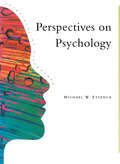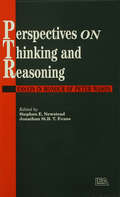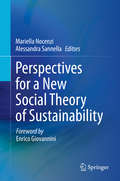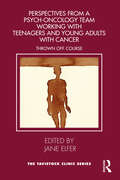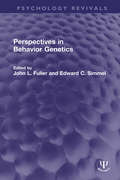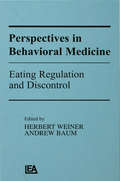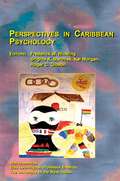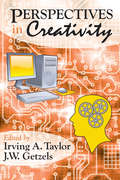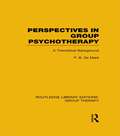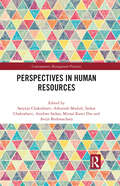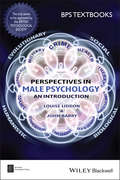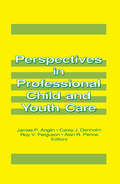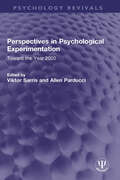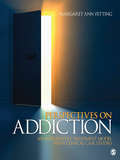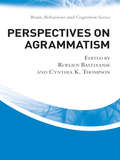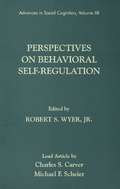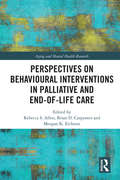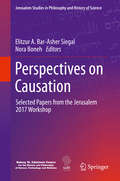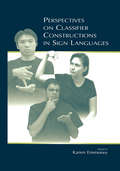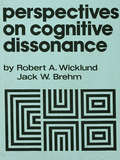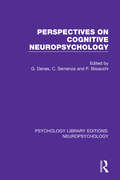- Table View
- List View
Perspectives On Psychology (Principles Of Psychology Ser.)
by Michael W. EysenckThis is a title in the modular "Principles in Psychology Series", designed for A-level and other introductory courses, aiming to provide students embarking on psychology courses with the necessary background and context. One aspect of this is to consider contemporary psychology in the light of its historical development. Another aspect is to examine some of the major controversies which have dominated psychology over the centuries. Yet another aspect is to consider some of the major areas of psychology eg social, developmental, cognitive in terms of what they have to offer in the quest for an understanding of human behaviour.; The book also addresses key issues which need to be considered as psychology matures into a fully fledged experimental and scientific discipline. For example, how much do laboratory experiments tell us about how people behave in the real world? And how far is it ethically permissable for psychologists to go in their pursuit of knowledge?
Perspectives On Thinking And Reasoning: Essays In Honour Of Peter Wason
by Stephen E. Newstead Jonathan St.B. T. EvansThis collection of essays focuses on three reasoning problems devised by Peter Wason - the selection task, the 2-4-6 task, and the THOG problem - which have had a considerable influence since their invention.; The reasons why people make so many errors in these seemingly simple tasks are still not fully understood. A variety of different theoretical perspectives have been used in trying to explain performance. These include the mental models approach, the pragmatic reasoning approach, and the mental logic approach. This book contains chapters which discuss all these theories. Other chapters review the literature or offer alternative theoretical perspectives. A final chapter by Peter Wason describes how he came to create the tasks discussed.
Perspectives for a New Social Theory of Sustainability
by Mariella Nocenzi Alessandra SannellaThis ambitious book outlines the theoretical and practical implications of the recent technological revolution of human/non-human relations for social researchers, and in so doing, seeks to develop more adequate theoretical and methodological models for social scientists to describe and investigate these social transformations and their consequences. The environmental strategies to balance human actions with the earth’s resources utilizing a sustainable approach can inspire original conceptualizations and, therefore, a new sociological paradigm rooted in a necessary rethinking of the dualism between nature and culture, and of human relations in a hyper-connected society increasingly composed by non-human elements. Chapter discussions include: Sustainability and the crisis of the theoretical functional modelEnvironmental sustainability and the evolution of capitalismFrom moral imperatives to indicators and indices: a methodology for validating and assessing SDGsAn understanding of psychopathological syndromes related to social environmentsSocial research between participation and critical detachment Perspectives for a New Social Theory of Sustainability emphasizes that not only are modernist theories of unlimited wealth and progress no longer supportable, but also that their theoretical and empirical settings must be reassessed if society is to move towards sustainability. It promises to be required reading for students and researchers in sociology, psychology, economics and statistics, as well as professionals within government organizations and NGOs focused on human rights work, global inequities, ethical activism, and the UN Agenda 2030 and its Sustainable Development Goals."This book provides a unique toolkit for politicians and citizens on sustainable development and how it is fulfilled every day."David Maria SASSOLIEuropean Parliament President
Perspectives from a Psych-Oncology Team Working with Teenagers and Young Adults with Cancer: Thrown Off Course (Tavistock Clinic Series)
by Jane ElferExploring the work of a Psych-Oncology Team in an inpatient and outpatient setting, this powerful, interesting, and engaging book is about teenagers and young adults diagnosed with cancer. As part of the few multidisciplinary teams of this type in the United Kingdom, the authors offer helpful insights into supporting young people and their families as they navigate this complex and devastating disease, writing on key areas such as trauma, the effects of early childhood cancer in adolescence and beyond, the social and cultural effects of cancer treatment, hope, and hopelessness, and questions of mortality. Each chapter contains a mixture of clinical reflections and patient vignettes, along with clear guidance about how to support patients and their families both during and after treatment, and at the point of death too. With a compassionate approach to understanding the challenges for patients, their families, and clinicians alike, this is a book for nurses, doctors, occupational therapists, and physiotherapists, for parents and carers, and for young people who find themselves in this position and who can easily feel as though they are alone with their overwhelming feelings.
Perspectives from the European Language Portfolio: Learner autonomy and self-assessment
by Bärbel Kühn María Luisa Pérez CavanaUsing constructivist principles and autonomous learning techniques the ELP has pioneered innovative and cutting edge approaches to learning languages that can be applied to learning across the spectrum. Although articles on the success of the ELP project have appeared in some academic journals, Perspectives from the European Language Portfolio is the first book to report on and contextualise the project’s innovative techniques for a wider educational research audience. During the last ten years the ELP has increasingly become a reference tool for language learning and teaching in primary, secondary and tertiary educational settings all around Europe. The editors of this volume believe that there is a need to reflect on the significant contribution that the ELP has delivered for language learning and teaching, and to critically evaluate its achievements. This volume offers a range of investigations from theoretical studies to practical cases around these issues, and includes: relevant contributions of the ELP to language pedagogy; assessing the impact of the ELP on pedagogical research and practice; exploring and defining pathways for future developments; Reflective learning. This book is intended for a readership of language teachers and researchers across Europe. It will be of particular relevance to those engaged in language learning and teaching within the Common European Framework of Reference, supporting independent learning and developing a language curriculum, whether in school, adult, further or higher education.
Perspectives in Behavior Genetics (Psychology Revivals)
by John L. Fuller and Edward C. SimmelOriginally published in 1986, we were living in a world in which the number of publications in behaviour genetics had reached a point where it was difficult, even for those teaching the subject, to keep up with the literature. The editors of this title believe that there is a need for people who have planned and executed long-term research programs to summarize and comment on their results. This volume was intended to help meet that need. The authors were given free choice of subject and format. The result is a variety of topics that had been researched mainly over the previous decade. Chapter 1 is an exception and looked back at the work of others in behaviour genetics over a quarter-century and tried to detect trends in the types of research done in the field.
Perspectives in Behavioral Medicine: Eating Regulation and Discontrol (Perspectives on Behavioral Medicine Series)
by Andrew Baum Herbert WeinerFirst published in 1987. Routledge is an imprint of Taylor & Francis, an informa company.
Perspectives in Caribbean Psychology
by Frederick W. HicklingPerspectives in Caribbean Psychology attempts to record the unique psychological character of those who live in the Caribbean and more broadly people of African-Caribbean heritage. It considers the impact of colonialism, the struggle for domination by various European and North American countries through history on individuals, and the unique psychological realities that have emerged from attempts to come to terms with the realities of Caribbean culture and experience. Contributors address prevalent issues of violence, mental illness, stigma, psychopathology and HIV/AIDS, and chronicle the adaptation, cultural retentions, resilience and migratory tenacity of the Caribbean people, both within their geographic communities and in the Diaspora. This book makes the case for a definitively Caribbean psychology with a range of chapters on psychological assessment, understanding and treatment modalities culled from a Caribbean experience. It will be an invaluable source of reference for anyone with an interest in multicultural psychology, as well as for social work and mental health professionals working with members of the Caribbean community.
Perspectives in Creativity
by Irving TaylorIn Perspectives in Creativity experts in the psychology of creativity take stock of the field by examining their own experiences. The contributors relate how they embarked on their work, how their ideas developed, what in their thinking remained the same, what had changed, and how they evaluate their successes and failures.The introductory chapter provides a historical context for subsequent contributions. J. P. Guilford then describes the development of the field of creativity from the perspective of the Structure of Intellect model. Donald W. MacKinnon describes his work at the Institute of Personality Assessment and Research. J. W. Getzels and Mihalyi Csikszentmihalyi recount in the following chapter how, though starting with a conception of creativity as a problem-solving process, they were driven through their work with artists to a conception of creativity as also a problem-finding process. In the fifth chapter, Frank M. Andrews describes his investigations of the social and psychological factors in scientific laboratories.Frank Barron examines the problem of creativity and alienation. Anne Roe analyzes the sources and development of paintings as reported by twenty artists. In the following chapter, Salvatore Maddi examines the widely held belief that social integration and a permissive environment are conducive to creative endeavor. In chapter 9, Calvin Taylor and Richard Ellison describe the development of the Utah program of assessment and intervention with regard to the creativity of children in the classroom. Next, Sidney Parnes discusses his work on "brainstorming" and its emphasis on a balance between imagination and judgment, freedom, and discipline. George Prince tells of the development of "synectics" since its early formulation and recounts its application to creative production in industry. E. Paul Torrance then examines recent creativity in the schools and describes his own efforts in devising diagnostic tests and educati
Perspectives in Financial Therapy
by Prince Sarpong Liezel AlsemgeestAs we deepen our understanding of the interplay between money and psychology, financial therapy has emerged as a popular field of study. This book offers a diverse range of perspectives on the practice of financial therapy, exploring its benefits, challenges, and potential critiques. The book also provides practical guidance for financial therapists as well as financial planning and mental health practitioners who incorporate financial therapy into their work. The book covers a wide range of topics, including the neurobiology of financial decision-making, models in financial therapy, online financial therapy, generational differences in financial attitudes, incorporating financial therapy into divorce planning, and techniques for coping with the stresses associated with estate planning. The book addresses the need for culturally relevant assessments of financial therapy in African contexts and offers a critical appraisal of the field of financial therapy. By providing multiple perspectives and practical guidance, this book will be a valuable resource for students, scholars, and researchers in financial therapy, financial planning and related fields, as well as the broader field of psychology.
Perspectives in Group Psychotherapy: A Theoretical Background (Routledge Library Editions: Group Therapy)
by P.B. de MaréThis book, originally published in 1972, aimed to provide a theoretical framework for group therapists to guide them through the mass of variables which beset them. Its scope therefore is extremely broad, for it also touches on philosophy, psychology, sociology, communication and general systems theory. In the last chapter certain conclusions are drawn concerning the relationship between group and psycho-dynamics. The book will be of interest to those who have already had some experience of small, medium or large groups, and who want to think about their work in more general terms: it was not at the time widely realised how radically different and how potentially powerful are the implications of group procedures, not only for therapy but in such fields as education, industry and politics. Freud recognised this when he pointed out the dilemma of having to procure for the group precisely those features which were characteristic of the individual, and which are extinguished in him by the formation of the group. Whilst the problem for the individual is the intrusion of unconscious factors, for the group it is the group’s equivalent of consciousness, namely communication and organization, which is in a quandary. The group model differs crucially from the psychological, but they may relate in the sense that, as Freud indicated, neurosis represents a recapitulation within the individual of mankind’s group history. The unconscious mind, then, is a group phenomenon. In other words, group theory turns psychoanalysis upside down and begins at the point where Freud left off, relating neurosis to its social sources. In the light of the group approach, therefore, neurosis and certain of the psychoses can be viewed as localized deposits of unresolved group experiences within the individual, whether they be past, current or an expectation of the future; a feature which makes traumatic neuroses more understandable since they cannot be explained in terms of infantile neurosis. The author suggested the possibility of a new development in group techniques, namely that of large group therapy freed of community ties or training considerations, in which attitudes and ideologies make themselves evident, not as cloudy idealistic non sequiturs but as crucial and clearly definable climates which either impede or promote communication and the flow of information.
Perspectives in Human Resources (Contemporary Management Practices)
by Satyajit Chakrabarti Anirban Sarkar Ashutosh Muduli Saikat Chakrabarti Mrinal Kanti Das Avijit BrahmacharyThis book takes a practical approach to human resource management (HRM), providing practising managers, researchers, and students with a framework for developing and implementing human-centred HR strategies.Enabling human-centred HRM approaches allows businesses and industries to implement suitable processes and systems which keep their employees’ wellbeing in mind and build sustainable workforces, and organisations. The book focuses on the use of numerous tools in HR analytics and their application across disciplines and industries. Using empirical data, review of existing research, and case studies, the chapters in the volume look at the organisational processes and performance of various HRM strategies and explore themes such as diversity and inclusiveness in the workplace, organisational culture, inclusive leadership, non-verbal communication, cross-cultural management, work-life balance, and the focus on the physical and emotional wellbeing of employees.Part of Contemporary Management Practices series, this book will be useful to practising managers, researchers, and students of human resource management, organizational studies, business studies, psychology, and behavioural sciences.
Perspectives in Male Psychology: An Introduction (BPS Textbooks in Psychology)
by John Barry Louise LiddonPERSPECTIVES IN MALE PSYCHOLOGY Discover a balanced perspective on men’s psychology in this accessible new resource Male psychology is a new field within the discipline of psychology, which focuses on men and boys. Male psychology moves us towards a more scientific and balanced understanding of the psychology of men and of boys, drawing on a range of perspectives, and away from an overreliance on social constructionism and preoccupations with notions such as patriarchy and privilege, too often seen in the narrative about men. In Perspectives in Male Psychology: An Introduction, two of the most prominent authors in this new field, Louise Liddon and John Barry, introduce and deliver an insightful exploration of some of today’s most hotly contested issues regarding men and masculinity. This book puts forward a balanced perspective that has been missing from academic and media narratives around topics such as child development, education, sport and exercise, the workplace, crime, the military, health and wellbeing, mental health, therapy, masculinity, and sex differences, and considers the role that evolution, biology, and culture play in shaping male behavior. This book will also help readers to better understand some key issues such as: Why there are controversies around sex differences research How bias in research has led to a distorted view of the psychology of men and boys The ways in which the mental health and other needs of men and boys are routinely overlooked In turn this helps us ask some important questions such as: If there are more similarities than differences between men and women, does that mean the differences are unimportant? How can we un-distort our understanding of men and masculinity? What are the best ways of identifying and meeting the psychological needs of men and boys? Readers, whether students or lecturers, will also benefit from the inclusion of our companion Wiley website containing additional resources to support the development of knowledge and understanding of male psychology. Perfect for undergraduate and graduate students in psychology, medicine, and sociology, as well as established professionals in these and related fields, Perspectives in Male Psychology: An Introduction will also earn a place in the libraries of anyone interested in the psychology of sex and gender differences in various aspects of mental health and human behaviour.
Perspectives in Professional Child and Youth Care (The\child And Youth Services Ser.)
by James P Anglin Jerome BekerHere are the information, ideas, and inspiration that will help child care workers in their daily struggle to provide better care for children, youth, and families. Perspectives in Professional Child and Youth Care is a much-needed sourcebook of readings on the current state of the art of professional child and youth care in North America. Some of the leading practitioners, academicians, researchers, and administrators provide a “child care perspective,” writing about what they--on the front lines--perceive as the most pressing issues and significant topics in the field today, including the nature of child and youth care, current issues in education and training, therapeutic program issues, key support functions in child and youth programs, the changing work environment and new roles, and developing professionalism in the field of child and youth care. This enormously insightful book will be valuable for use in academic courses and training workshops, as well as for individual child and youth care professionals and practitioners from related disciplines.
Perspectives in Psychological Experimentation: Toward the Year 2000 (Psychology Revivals)
by Viktor Sarris Allen ParducciOne response to questions about the future of psychology is to attempt an answer to another question: What have we learned from psychology’s past? Originally published in 1984, reissued here with a new preface, this book presents a collection of original papers by authorities with international reputations in various fields of psychology at the time. Contributors were invited to appraise the past of their own research specialties, with an eye toward the future. The emphasis is upon the more scientific areas of psychological research.The catalyst for this book was an international conference honoring Gustav A. Lienert held in 1981. Psychologists from both Western and Eastern Europe, North and South America, and representing fields as different as psychophysics is from clinical psychology, or animal memory from human decision making, described their research and argued the prospects for the future of experimental psychology. Most of the arguments found their way into this book where readers could confront the different viewpoints at the time and those reading it today can see how accurate their predictions were for the future.
Perspectives of Divorced Therapists: Can I Get It Right for Couples?
by Tanya RadeckerThrough interviews with divorced therapists from diverse cultures, philosophies, and generations, this book explores how a therapist’s divorce impacts their work with clients in couples therapy. Interviewees speak of their own experiences with trauma recovery, countertransference, self-disclosure, resilience, and other issues during and after divorce. These experiences are also correlated to previous studies exploring the counseling process and variables that might affect the outcome. Through the stories of other professionals, therapists will gain insight into developing self-awareness and utilizing the person-of-the-therapist model to successfully navigate the impact of their own life crisis as they work with clients. This text will provide enlightenment and courage for divorced or divorcing therapists, as well as any therapist who lives through the experience of managing their own relationship struggles while continuing to lean in and support their clients.
Perspectives on Addiction: An Integrative Treatment Model with Clinical Case Studies
by Margaret A. FettingPerspectives on Addiction presents a comprehensive, rigorous, and reflective overview of the complex and controversial field of chemical dependency. It is designed for students and clinicians who come in contact with and treat individuals and families struggling with the causes and consequences of substance use disorders. The user-friendly approach to serious content encourages active participation in the learning experience and is designed to have a personal, professional, educational and treatment impact. Readers will develop a novel appreciation for a human desire that pleasures, confounds, and destroys.
Perspectives on Agrammatism (Brain, Behaviour and Cognition)
by Roelien Bastiaanse Cynthia K. ThompsonAgrammatic aphasia (agrammatism), resulting from brain damage to regions of the brain involved in language processing, affects grammatical aspects of language. Therefore, research examining language breakdown (and recovery) patterns in agrammatism is of great interest and importance to linguists, neurolinguists, neuropsychologists, neurologists, psycholinguists and speech and language pathologists from all over the world. Research in agrammatism, studied across languages and from different perspectives, provides information about the grammatical structures that are affected by brain damage, their nature, and how language (and the brain) recovers from brain damage. The chapters in this book focus on the symptoms that arise in agrammatic aphasia at the lexical, morphological and sentence level and address these impairments from neurolinguistic, neuropsychological and neurological perspectives. Special attention is given to methods for assessment and treatment of agrammatism and to the neurobiological changes that can result from the treatments. Perspectives on Agrammatism provides an up-to-date overview of research that has been done over the past two decades. With contributions from the most influential aphasiologists from Europe and the United States, it provides an indispensable reference for students and academics in the field of language disorders.
Perspectives on Anger and Emotion: Advances in Social Cognition, Volume Vi (Advances in Social Cognition Series #Vol. 6)
by Robert S. Wyer Thomas K. SrullIn this volume, Berkowitz develops the argument that experiential and behavioral components of an emotional state are affected by many processes: some are highly cognitive in nature; others are automatic and involuntary. Cognitive and associative mechanisms theoretically come into play at different times in the emotion-cognition sequence. The model he proposes, therefore, integrates theoretical positions that previously have been artificially segregated in much of the emotion-cognition literature. The breadth of the implications of Berkowitz's theory is also reflected in the diversity of this book's companion chapters. Written by researchers whose work focuses on both social cognition and emotion, these articles provide important insights and possible extensions of the "cognitive-neoassociationistic" conceptualization developed in the target article. Although each chapter is a valuable contribution in its own right, this volume, taken as a whole, is a timely and important contribution both to social cognition and to research and theory on emotion per se.
Perspectives on Behavioral Self-Regulation: Advances in Social Cognition, Volume XII (Advances in Social Cognition Series #Vol. 12)
by Robert S. WyerThe feedback model of self-regulation developed by the authors of the lead article in this volume has been one of the most successful theoretical formulations of regulatory processes to date. The range of phenomena to which this framework potentially applies is evident from its ability to incorporate implications of other conceptualizations as diverse as catastrophe theory and dynamic systems theory. The diversity of issues and approaches dealt with by Carver and Scheier is matched by the companion articles, which are written from perspectives ranging across developmental psychology, cognitive science, clinical psychology, and organizational decision making, as well as mainstream social cognition.
Perspectives on Behavioural Interventions in Palliative and End-of-Life Care (Aging and Mental Health Research)
by Rebecca S Allen Brian D Carpenter Morgan K. EichorstThe challenges faced by individuals and families at the end of life are still incredibly diverse, and many behavioural interventions and clinical approaches have been developed to address this great diversity of experiences in the face of dying and death, helping providers to care for their clients. Perspectives on Behavioural Interventions in Palliative and End-of-Life Care is an accessible resource that collates and explores interventions that can be used to address a wide range of behavioural, psychological, social and spiritual issues that arise when people are facing advanced chronic or life-limiting illness. <P><P> With perspectives from experienced clinicians, providers, and caregivers from around the world, this book offers a strong foundation in contemporary evidence-based practice alongside seasoned practice insights from the field. Its chapters explore: <P><P> Interventions to enhance communication and decision making <P><P> The management of physical and mental health symptoms <P><P> Meaning-Centred Psychotherapy for cancer patients <P><P> Dignity Therapy <P><P> Interventions embracing cultural diversity and intersectionality. <P><P> Together with Perspectives on Palliative and End-of-Life Care: Disease, Social and Cultural Context, the book provides a foundation for collaborative international and interprofessional work by providing state-of science information on behavioural interventions addressing mental health and wellness. It is of interest to academics, researchers and postgraduates in the fields of mental health, medicine, psychology and social work, and is essential reading for healthcare providers and trainees from psychosocial and palliative medicine, social work and nursing.
Perspectives on Causation: Selected Papers from the Jerusalem 2017 Workshop (Jerusalem Studies in Philosophy and History of Science)
by Elitzur A. Bar-Asher Siegal Nora BonehThis book explores relationships and maps out intersections between discussions on causation in three scientific disciplines: linguistics, philosophy, and psychology. The book is organized in five thematic parts, investigating connections between philosophical and linguistic studies of causation; presenting novel methodologies for studying the representation of causation; tackling central issues in syntactic and semantic representation of causal relations; and introducing recent advances in philosophical thinking on causation. Beyond its thematic organization, readers will find several recurring topics throughout this book, such as the attempt to reduce causality to other non-causal terms; causal pluralism vs. one all-encompassing account for causation; causal relations pertaining to the mental as opposed to the physical realm, and more. This collection also lays the foundation for questioning whether it is possible to evaluate available philosophical approaches to causation against the variety of linguistic phenomena ranging across diverse lexical and grammatical items, such as bound morphemes, prepositions, connectives, and verbs. Above all, it lays the groundwork for considering whether the fruits of the psychological-cognitive study of the perception of causal relations may contribute to linguistic and philosophical studies, and whether insights from linguistics can benefit the other two disciplines.
Perspectives on Classifier Constructions in Sign Languages
by Karen EmmoreyClassifier constructions are universal to sign languages and exhibit unique properties that arise from the nature of the visual-gestural modality. The major goals are to bring to light critical issues related to the study of classifier constructions and to present state-of-the-art linguistic and psycholinguistic analyses of these constructions. It is hoped that by doing so, more researchers will be inspired to investigate the nature of classifier constructions across signed languages and further explore the unique aspects of these forms. The papers in this volume discuss the following issues: *how sign language classifiers differ from spoken languages; *cross-linguistic variation in sign language classifier systems; *the role of gesture; *the nature of morpho-syntactic and phonological constraints on classifier constructions; *the grammaticization process for these forms; and *the acquisition of classifier forms. Divided into four parts, groups of papers focus on a particular set of issues, and commentary papers end each section.
Perspectives on Cognitive Dissonance
by R. A. Wicklund J. W. BrehmPublished in 1976, Perspectives on Cognitive Dissonance is a valuable contribution to the field of Social Psychology.
Perspectives on Cognitive Neuropsychology (Psychology Library Editions: Neuropsychology #6)
by G. Denes C. Semenza P. BisiacchiOriginally published in 1988, neuropsychology had evolved considerably in the decade prior to publication. Methods of research had changed, new topics of interests had emerged, and there had also been an ongoing debate as to the objectives of the field. This evolution had most radically affected the study of cognitive disorders – an area that had developed particularly rapidly in the years before and that ultimately became a field of inquiry in its own right, that of cognitive neuropsychology. The contributors to this volume all share a fascination with the new perspectives for understanding how the mind works that have arisen from the study of impaired cognition. Yet, and this was very characteristic of the state of the art in cognitive neuropsychology at the time, they disagreed on many important issues, even those pertaining to the most basic assumptions of their discipline. Therefore, the first part of this book is devoted to an attempt to define and clarify these basic issues and to the confrontation of alternative views. The remaining parts present original studies on several topics of particular interest in cognitive neuropsychology.
